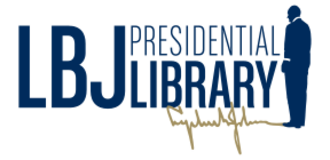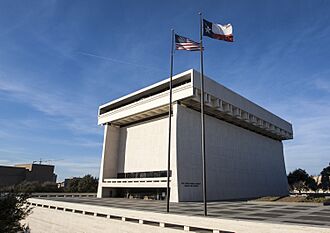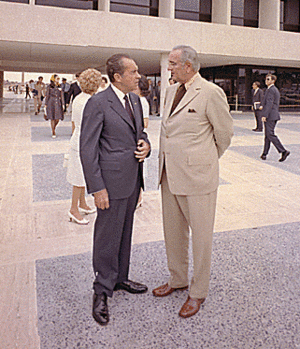Lyndon Baines Johnson Library and Museum facts for kids
Quick facts for kids Lyndon Baines Johnson Library and Museum |
|
|---|---|
 |
|

The Lyndon Baines Johnson Library and Museum in 2017
|
|
| General information | |
| Location | 2313 Red River St, Austin, Texas, United States |
| Coordinates | 30°17′09″N 97°43′45″W / 30.2857°N 97.7292°W |
| Named for | Lyndon B. Johnson |
| Inaugurated | Dedicated on May 22, 1971 |
| Management | National Archives and University of Texas at Austin |
| Technical details | |
| Size | 14 acres (5.7 ha) |
| Design and construction | |
| Architect | Gordon Bunshaft of Skidmore, Owings & Merrill |
The Lyndon Baines Johnson Library and Museum, often called the LBJ Presidential Library, is a special museum for Lyndon B. Johnson, the 36th president of the United States. A presidential library is a place that stores all the important papers and objects from a president's time in office.
This library is located at the University of Texas at Austin. It is one of 15 presidential libraries managed by the National Archives and Records Administration, a U.S. government agency that takes care of important historical records. The LBJ Library holds an amazing 45 million pages of documents from President Johnson and his team.
Contents
Building the Library
Planning and Construction
Soon after President Johnson won the 1964 election, people started talking about creating a library for him. The University of Texas at Austin offered to build it on their campus. The university paid for most of the construction, which cost about $18 million in total.
The land for the library was once a neighborhood. The university bought the land through a process called eminent domain, which allows the government to buy private property for public use.
First Lady Lady Bird Johnson helped design the library. She visited other presidential libraries to get ideas. The architect Gordon Bunshaft was chosen to design the building. Construction started in 1967 and finished a few years later.
Grand Opening
The library officially opened on May 22, 1971. Both President Johnson and the president at the time, Richard Nixon, attended the ceremony.
In 2007, after Lady Bird Johnson passed away, she was honored at the library, just as her husband had been after his death in 1973.
The library got a major update in 2012. Many exhibits were redesigned to be more modern and interactive. When it reopened, it began charging a small fee for visitors for the first time.
What's Inside the Museum?
The library is a large, 10-story building made of a type of stone called Italian travertine. It sits next to the Lyndon B. Johnson School of Public Affairs on a 14-acre campus. Even though it's on university land, the library is run by the federal government.
Main Exhibits
One of the most popular exhibits is a replica of the Oval Office from the White House. It's almost the same size as the real one and is decorated exactly how it was when Johnson was president. It even includes a copy of the famous Johnson desk.
Another fun feature is an animatronic figure of LBJ. This robot-like figure tells stories and jokes, making history come alive for visitors.
From the library's terrace, you can see the Texas State Capitol building. This view is so important that a law protects it from being blocked by new, tall buildings.
The museum welcomes about 125,000 visitors every year. It is open almost every day, except for Thanksgiving, Christmas, and New Year's Day.
The LBJ Liberty & Justice for All Award
The library gives a special award to honor people who have served the public well. The "LBJ Liberty & Justice for All Award" is for leaders who work together respectfully with people from different political parties.
Some of the people who have received this award include:
- 2010: John Lewis, a civil rights leader
- 2013: George H. W. Bush, the 41st U.S. President
- 2016: Jimmy Carter, the 39th U.S. President
- 2018: John McCain, a U.S. Senator
- 2019: Nancy Pelosi, a Speaker of the House
- 2020: Ruth Bader Ginsburg, a Supreme Court Justice
- 2023: Willie Nelson, a famous musician and activist
- 2024: Joe Biden, the 46th U.S. President
See also
 In Spanish: Biblioteca y Museo Presidencial de Lyndon B. Johnson para niños
In Spanish: Biblioteca y Museo Presidencial de Lyndon B. Johnson para niños
- D. B. Hardeman Prize
- Presidential memorials in the United States
 | Stephanie Wilson |
 | Charles Bolden |
 | Ronald McNair |
 | Frederick D. Gregory |


